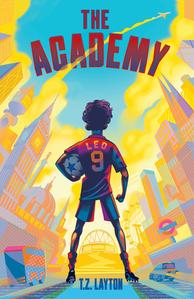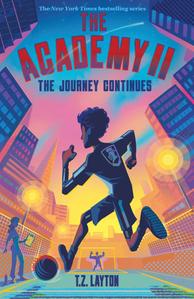
|
|
| T.Z. Layton (Robin Shetler Photography) |
|
T.Z. Layton channeled his life as a soccer dad and youth soccer coach into the Academy series, a middle-grade series that was originally self-published and has now been repackaged and released by Sourcebooks. The Academy follows 12-year-old soccer player Leo, who moves to England after he is professionally scouted to compete for a prestigious spot in the elite London Dragons football youth squad. The first two books, The Academy and The Academy II: The Journey Continues, are available now.
The Academy starts with a soccer match in the first chapter, and the games only get more important from there. What are some of the logistical challenges of describing a soccer match on the page?
It isn't easy, and I spend a lot of time on this. Knowing how much of the game to portray is key. You want details but not so many that the reader is overwhelmed by the action. Each team has 11 players: that's 22 players on the field at one time. It's difficult to illuminate all of them without the reader getting lost. Leo--the main character--is the focus, of course, but readers develop a bond with the other players and want to know what they're doing, too. It takes a lot of rewrites!
 Juggling all those characters isn't just a challenge on the pitch--it's a challenge in developing a series! What did planning the Academy series entail?
Juggling all those characters isn't just a challenge on the pitch--it's a challenge in developing a series! What did planning the Academy series entail?
Developing story worlds is one of my favorite parts of the job--I get to create an entire fictional universe to bring to readers. Once the Academy took off, I started imagining where I could go with Leo and his friends. Not just their journey to the Premier League but their journey as young people coming into their own. It's a work in progress, but I spend a lot of time fleshing out their world in outlines and brainstorming sessions. In terms of my process, before I start writing, I produce a "storymap" for each book with a plot outline, thematic goals, and character sketches. It can get pretty long: often it's 50 pages or more. It's just a guide, though. Once I start writing, I let the story flow organically. In terms of the larger story world--the map of the whole series--I have a rough idea of where I'm going, and I sit down from time to time and expand this outline as well.
Finances weigh heavy on Leo's mind, an understandable situation as a child of a single parent facing housing insecurity. How did you incorporate Leo's financial difficulties and the pressure of financial success with his academy aspirations?
These days, so many families are struggling that I knew I wanted to include this aspect of Leo's life. However, kids can get easily bored by such things, and don't want to be preached to. I tried my best to weave in the financial struggles in a subtle manner, so they would (hopefully) resonate without taking center stage.
How do you channel the lives of real soccer-playing kids into these books?
I was that kid, so there's a lot of memories to draw from! Also, my son was 10 when I started the first book. Watching him grow up on and off the field was critical to the development of the series. I was able to draw dialogue and social cues from his interactions with his friends. One thing that is different today from when I grew up: so many more kids are passionate about soccer, and they really understand the game. They know all the professional teams, leagues, and star players. To make the books ring with authenticity, I have to keep up with the modern game (which is a pleasure!).
 Your books are finding new life with Sourcebooks, but you already have a robust VIP Reader's Club for young fans, complete with merch store--much like a real soccer team! What has been your experience with kids connecting to Leo, the Knights, and the Dragons?
Your books are finding new life with Sourcebooks, but you already have a robust VIP Reader's Club for young fans, complete with merch store--much like a real soccer team! What has been your experience with kids connecting to Leo, the Knights, and the Dragons?
Overwhelmingly positive. I was as surprised as anyone when the Academy series took off and I started receiving fan mail from young readers around the world. I also began receiving loads of heartfelt notes from parents and educators with one recurrent theme: that the series was helping to bring reluctant readers into the world of books. That floored me and fueled my desire to expand the series.
You started this series because you were having trouble finding books that connected with your young son. Would you speak to that and the gap you feel your series fills in the children's book market?
Personally, I think there is an entire universe of incredible fiction for children. But when my son turned 10, he stopped reading on his own. Nothing held his interest. He wanted books about soccer and video games, of which there were very few. Novelists (and publishers) need to create what's in their heart. But if we can do that and reach children where they are, I think we'll get more kids reading.
Is your entire focus on the Academy right now, or do you have plans for other series focused on reluctant readers?
I've also started a volleyball series aimed at girls 10-15, which Sourcebooks plans to release next fall. After writing soccer novels for my son, my daughter, who's an avid volleyball player, wanted to know when her book was coming. I'm a lifelong volleyball player, too, and similar to the Academy series, I saw a lack of novels in this space. Volleyball is a huge sport for girls, and I'm excited to give them something sports-oriented to read.
What do you hope readers will take from Leo's ambitions and hard work?
I did try to impart the value of hard work, training, nutrition, and a host of other factors that lead to success at the highest level (or any level). Most of all, however, I wanted young readers to understand that Leo is a balanced person who plays for the love of the game. --Nicole Brinkley, bookseller and writer

